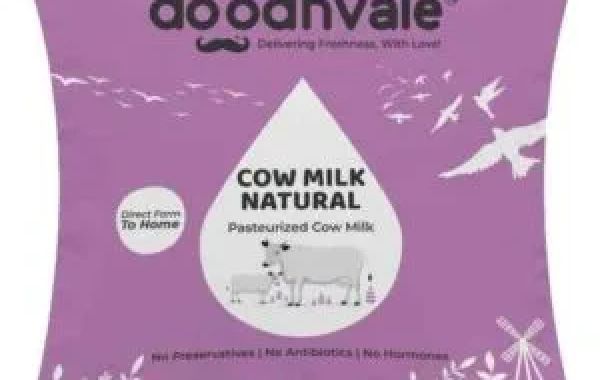Cow milk, a familiar sight in our refrigerators, has been a source of nutrition for centuries. But with so many conflicting opinions floating around, it's natural to wonder: is cow milk actually good for us? Let's dive into the creamy depths of this question and separate the facts from the fads.
Doodhvale is a company that brings fresh cow milk straight from the farm to your doorstep. They're like the superheroes of fresh milk delivery! They source their milk from happy cows on high-tech dairy farms, ensuring the cows are treated well and fed a healthy diet. No stress for the cows means better quality milk for you.
Why choose cow milk?
Cow milk is a readily available and affordable source of essential nutrients. It's a good source of protein, calcium, vitamin D, and other vitamins and minerals. These nutrients play various roles in the body, including building strong bones and teeth, supporting muscle function, and boosting the immune system.
Types of cow milk: Navigating the options
Before diving into the benefits, it's helpful to understand the different types of cow milk available:
Whole milk: This contains the highest fat content (around 3.25%).
Reduced-fat milk: This has some of the fat removed, usually around 2%.
Low-fat milk: This has even less fat, typically around 1%.
Skim milk: This has most of the fat removed, leaving less than 0.5%.
Homogenized milk: This has the fat particles evenly distributed, preventing the formation of a cream layer.
Non-homogenized milk: In this type, the fat rises to the top, forming a cream layer.
Organic milk: This comes from cows raised on organic feed and not given antibiotics or growth hormones.
A2 milk: This type contains only the A2 type of beta-casein protein, which some individuals believe is easier to digest.
The best type for you depends on your individual preferences and dietary needs. You can consult a healthcare professional for personalized guidance.
Benefits of cow milk
Now, let's explore the potential benefits of incorporating cow milk into your diet:
Strong bones and teeth: Cow milk is a rich source of calcium, which is crucial for building and maintaining strong bones and teeth. Vitamin D, also present in cow milk, helps with calcium absorption.
Muscle building and repair: The protein in cow milk provides essential amino acids that contribute to muscle building, repair, and maintenance.
Improved heart health: Some studies suggest that consuming dairy products like cow milk in moderation may be associated with a lower risk of heart disease. However, more research is needed to confirm this connection.
Weight management: Cow milk, especially low-fat and skim milk, can be a part of a healthy weight management plan as it provides essential nutrients without being high in calories.
Hydration: Cow milk, like most beverages, contributes to your daily fluid intake, which is vital for overall health and well-being.
However, it's important to note that these benefits are not exclusive to cow milk. Individuals with lactose intolerance, allergies, or ethical concerns can explore alternative sources of these vital nutrients, such as plant-based milks fortified with calcium and vitamin D.
Steps to make informed choices
Here are some tips to help you make informed choices about consuming cow milk:
Be mindful of portion sizes: While cow milk offers benefits, moderation is key. Stick to the recommended serving sizes based on your age and dietary needs.
Consider your health: If you have any underlying health conditions, consult your doctor before making significant changes to your diet, including cow milk consumption.
Explore different options: With various types of cow milk available, choose the one that best suits your taste preferences and dietary restrictions.
Check the label: Pay attention to the fat content, added sugars, and other ingredients when selecting cow milk.
Conclusion
Whether cow milk is "good" for you ultimately depends on your individual needs and circumstances. If you tolerate it well and enjoy its taste, it can be a valuable addition to a balanced diet. However, remember that it's not the only source of essential nutrients. Listen to your body, consult healthcare professionals when needed, and explore options that best align with your health goals and preferences.
FAQs
Is cow milk good for everyone?
Cow milk is not suitable for everyone. Individuals with lactose intolerance, allergies to milk protein, or ethical concerns might need to seek alternative sources of nutrients.
What are some alternatives to cow milk?
Various plant-based milks like soy milk, almond milk, oat milk, and coconut milk are available, often fortified with calcium and vitamin D.
How much cow milk should I drink daily?
The recommended daily intake of cow milk varies depending on age and individual needs. It's best to consult a healthcare professional for personalized guidance.








